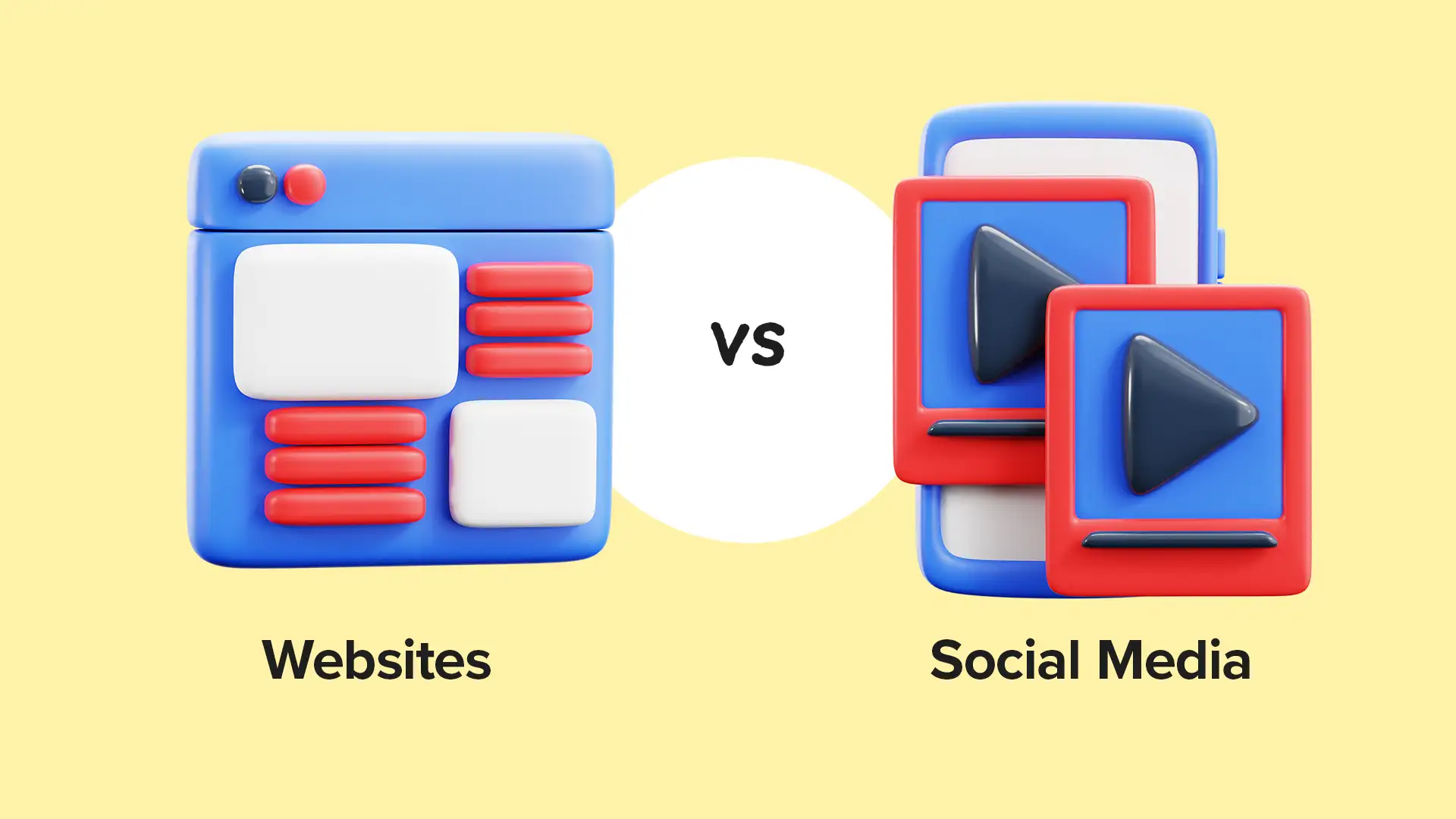
In today’s world, both websites and social media platforms are crucial for a brewery, bar, or restaurant’s online presence. However, consumer habits show distinct preferences for each, depending on the context of their search or interaction.
In this guide, we’ll go over the basics, walk you through how to leverage these tools effectively, and show you how understanding these trends can help your venue better meet your customers’ expectations.
What We’ll Cover in This Piece:
Why Websites? A Tool For Consumer Decision-Making

When consumers search for a place to grab a drink or a bite to eat, their primary goal is quickly finding reliable and detailed information. Websites cater to this need by offering a centralized hub for everything potential customers want to know: menus, hours of operation, location, contact details, and online reservations.
Here’s why consumers lean toward websites for specific purposes:
Reliability of Information and Brand Trust
A professionally built website is perceived as more trustworthy and authoritative than a social media profile. Consumers expect websites to be the most accurate source for details like operating hours, menu changes, and special offers.
Depth of Content
While social media posts can share snapshots of a restaurant’s offerings or events, they lack the depth of a dedicated website. Consumers visiting a website can access comprehensive information, including detailed menus, nutritional details, allergen information, and event schedules.
Ease of Navigation
Websites are designed to streamline user experience with intuitive navigation menus and search functionalities. For example, a visitor to your website can find specific menu items or book a table in just a few clicks, a convenience not offered by social media platforms.
Why Social Media? A Tool for Discovery and Engagement

Social media, on the other hand, excels at discovery, engagement, and community building. Consumers go to platforms like Instagram, Facebook, and TikTok for inspiration, reviews, and updates.
Here’s why social media pages are essential:
Visual Appeal
Platforms like Instagram are ideal for showcasing mouthwatering food photos, videos, and user-generated content. These visuals can draw in potential diners who are browsing for inspiration.
Real-Time Engagement
Social media enables immediate interaction with customers. Whether answering a direct message or responding to a comment, these platforms foster a sense of connection and accessibility.
Discovery Through Algorithms
Social media algorithms often introduce users to restaurants they haven’t searched for directly. For instance, a foodie or beer enthusiast scrolling through Instagram may stumble upon your business via hashtags, reels, or influencer collaborations.
Why Websites Win

While social media platforms are popular for exploration and casual engagement, websites dominate when it comes to final decision-making. Consumers prefer websites for tasks that require accuracy, structure, and immediacy, including:
Finding Menu Information
While a social media post may highlight a special dish, consumers often turn to websites for a full, updated menu. They trust that what’s listed on the website will reflect actual offerings.
Booking Table Reservations or Placing Orders
Features like online reservations and ordering systems are more commonly and effectively implemented on websites. A streamlined checkout or booking process on a website is often faster and more reliable than navigating through social media links.
Seeking Professionalism and Brand Trust
Websites lend credibility to a restaurant. A polished website with an easy-to-use interface signals the business is well-established and professional. On the flip side, a lack of a website can raise concerns about a restaurant’s legitimacy or attention to detail.
The Limitations of Relying Soley on Social Media
While social media is essential, it comes with limitations that websites overcome:
Algorithm Dependency
Your social media posts are only as effective as the platform’s algorithm allows. Even if you post regularly, there’s no guarantee your content will reach all your followers. A well-designed and thoughtfully created website will help guests find your business through reliable SEO (Search Engine Optimization) practices.
Limited Information Space
Social media platforms restrict the amount of information you can share in a single post or bio. This can make it challenging to communicate all the necessary details about your restaurant. Plus, there are no dedicated places to post your menu and offerings on traditional social media platforms. Sure, you can likely figure out a way to get it on there, but it will become a challenge to keep it updated and visible.
Lack of Control
Your presence on social media is subject to the platform’s rules and changes. For example, a change in algorithm or policies can impact your visibility overnight. With a website, you retain complete control over your content and presentation.
Websites Plus Social Media: The Perfect Combination

While websites are indispensable for information and professionalism, social media shines in audience engagement and brand visibility. If you look at your peers, you’ll quickly discover that the most successful businesses and brands use both in tandem:
Social Media as a Funnel
Social media can direct potential customers to your website for deeper engagement. For example, an Instagram post featuring your signature dish or newest beer on tap can include a link to your website’s online ordering, menu, or specials page.
Websites for Conversion
Once visitors land on your website, they’re more likely to convert into paying customers through features like online reservations, promotions, and loyalty programs.
Putting It All Together
Consumer trends clearly show that while social media plays a vital role in attracting and engaging diners, websites remain the cornerstone of a brewery, bar, or restaurant’s online strategy. A website offers the depth, reliability, trust, and control that today’s discerning consumers expect when making dining decisions. By effectively integrating both platforms, restaurants can reach new audiences, build trust, and drive conversions seamlessly.
Other Content You May Enjoy
To succeed and grow your restaurant, bar, or brewery you need to stand out in local search results. Whether someone is searching for the “best craft beer near me” or “top-rated seafood restaurant in [your city],” Local SEO (Search Engine Optimization) helps your business appear at the top of those search results.
With 81% of consumers using Google Search and Maps to find local businesses, and nearly 90% of customers choosing a business on the first page of search results, optimizing your online presence is essential.
This guide will walk you through Local SEO strategies tailored for restaurants, bars, and breweries, covering Google My Business, website optimization, online reviews, local backlinks, and more.
By the end of this guide, you’ll have a step-by-step action plan to increase your search rankings, attract more local customers, and grow your business.
In today’s digital world, having a well-designed, functional website is essential for restaurants, bars, and breweries. It goes beyond having social media. A great website can help attract new customers, showcase menus, accept reservations, and even drive online sales. But one of the most common questions business owners ask is: How much should a website cost in 2025?
The answer depends on several factors, including the type of website, features, complexity, and whether you choose a DIY solution or hire a professional web developer. Costs can range from a few hundred dollars for a basic website to tens of thousands for a fully customized, feature-rich platform.
This guide will break down website costs for restaurants, bars, and breweries, helping you understand the pricing landscape and choose the best solution for your business
Trivia nights have become an incredible marketing strategy for bars, restaurants, and breweries to draw in crowds and engage with new customers. With the recent collaboration between Geeks Who Drink, Timeplay, and the iconic television show Jeopardy!, businesses now have an exciting opportunity to host the Jeopardy! Bar League. This partnership combines the global brand recognition of Jeopardy! with Timeplay’s cutting-edge technology and the fun of live trivia from the experts at Geeks Who Drink.
In this piece we’ll cover what this new collaboration between these two trivia powerhouses is and how you can bring this unique experience to your venue.
In today’s world, both websites and social media platforms are crucial for a brewery, bar, or restaurant’s online presence. However, consumer habits show distinct preferences for each, depending on the context of their search or interaction.
In this guide, we’ll go over the basics, walk you through how to leverage these tools effectively, and show you how understanding these trends can help your venue better meet your customers’ expectations.
As a restaurant, bar, brewery, or any venue with a food and beverage program, having a modern, functional, and aesthetically pleasing website isn’t just a luxury—it’s a necessity.
No matter the size of your business, your new potential customers often interact with your website first—and first impressions matter.
In this piece, we’ll explore the top website trends shaping the online presence of hospitality businesses in 2025. These trends will help your venue stand out and attract more customers while creating a unique and modern experience to establish the perfect guest experience from start to finish.
For bar owners, hospitality managers, and small business owners, selecting the right gin brands is more than just filling the shelves—it’s about curating a distinctive customer experience. Gin has soared in popularity, becoming a staple of modern cocktail culture. With its complex botanical infusions, gin offers versatile, memorable flavors that can attract a wide range of customers. But with so many choices available, which brands should you prioritize to bring out the best in your gin menu?
This guide explores the seven best gin brands that have proven themselves through quality, craftsmanship, and unique flavor profiles. By understanding what makes each brand special, you and your staff will be better equipped to create a standout gin selection that delights your patrons, reinforces your brand’s reputation with a robust gin drinks menu, and helps you continue crafting classic and innovative gin cocktails.
